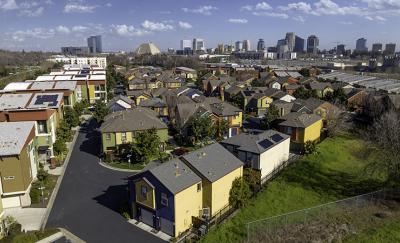Health Benefits of Climate Mitigation: An Overlooked Piece of the Benefits Puzzle



Governments are undervaluing climate mitigation benefits by overlooking the improvements in public health that result from reducing emissions.
Governments at all levels are making commitments to reduce greenhouse gas (GHG) emissions in order to fight climate change and strengthen the economy. President Biden has set a goal of net zero GHG emissions by 2050, and many states and local governments have made similar pledges. Achieving these goals will provide significant long-term, global benefits by helping to stabilize a warming planet. But, even in the aftermath of COP26, there is resistance to decarbonization at least in part due to financial concerns. Yes, meeting GHG emission reduction goals will require an unprecedented shift away from the combustion of fossil fuels to generate energy, but the result will be massive reductions in emissions of particulate matter, nitrogen oxides, sulfur dioxide, and other air pollutants. The improved air quality from reduced fossil fuel combustion will provide measurable health benefits, including avoided hospitalizations, asthma attacks, and even premature deaths, and the monetary value of these benefits is both knowable and significant.
Doing the Math: Quantifying the Health Benefits of Climate Mitigation
While most climate action plans acknowledge the potential for these benefits of improved air quality, nearly none of them attempt to quantify those benefits with any rigor. Abt Global reviewed climate action plans and decarbonization analyses conducted by more than 30 states and found that only three of them included quantitative estimates of the public health benefits from improved air quality.
The plan for one of those states—New York—included quantified health benefits based on work conducted by Abt. New York is on a path to net-zero GHG emissions by 2050 by transforming energy consumption in every sector—electricity generation, motor vehicles, industrial, and residential and commercial buildings. By monetizing the public health benefits of this transformation, New York was able to show that the total benefits of their climate action plan would exceed the costs.
The Build Back Better Act currently being debated in Congress includes billions of dollars in grant funding for states and local governments to develop climate action plans. Each of these plans can and should include a full accounting of the benefits of emissions reductions, including the public health benefits.
Abt Global can support this effort through the tools and methods we’re continually developing in our Climate HealthCounts™ framework.
Read More
Perspectives' Blogs on Climate Change

Housing California Annual Conference 2025
Join Abt Global and other leaders for the Housing California 2025 annual conference in Sacramento.

2025 Innovations and Solutions for Ending Unsheltered Homelessness (NAEH)
Meet the Abt Global team at NAEH’s 2025 Innovations and Solutions for Ending Unsheltered Homelessness conference in Los Angeles.

USAID PS3+ Bolsters Tanzania’s Public Sector Systems
The Tanzania Public Sector Systems Strengthening Project (PS3+) works across sectors to increase facility autonomy and capacity to deliver quality services at the lower levels of government structures and service provider facilities. The Project also engages and empowers communities.

Maternal Health in Rural America: Innovative Solutions
States and communities are developing and implementing innovative approaches to reduce the alarmingly high rate of preventable maternal deaths in the rural U.S.